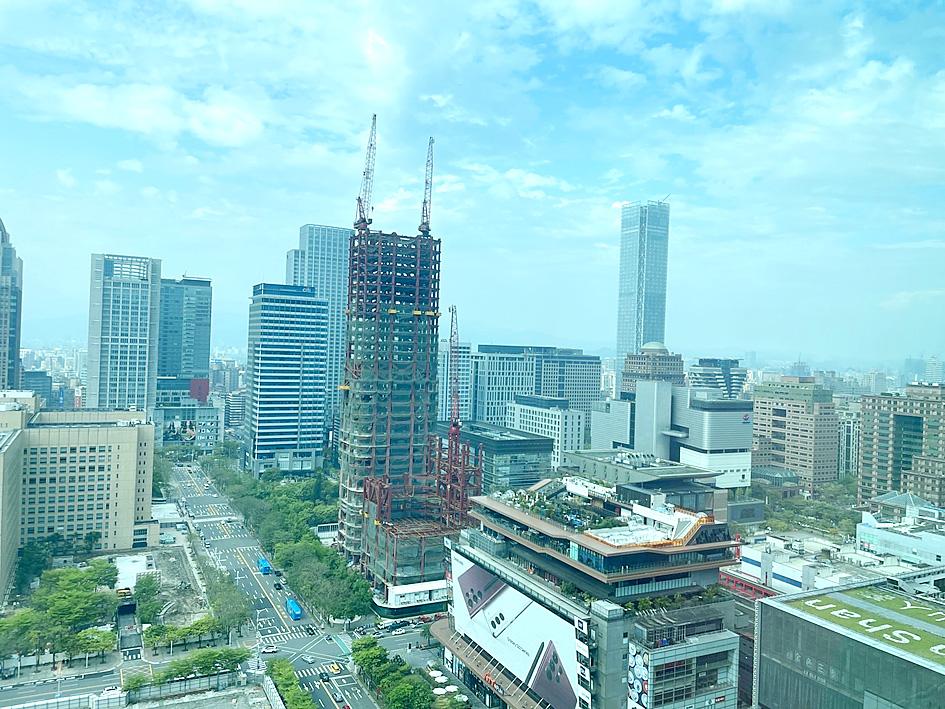Companies from various sectors are acquiring hotels drained of cash due to the COVID-19 pandemic to convert them into office spaces, apartments and workers’ dorms, property broker CBRE Taiwan said yesterday.
Several hotels have exited the market over the past two-and-a-half years, succumbing to business slowdowns as a result of COVID-19 border controls and social distancing restrictions, CBRE Taiwan said.
The Ministry of the Interior has offered tax relief and renovation subsidies to help some distressed hotels transform into temporary social housing, while others have sought to sell properties to generate cash flow, it said.

Photo: Hsu Yi-ping, Taipei Times
“It is wise to buy idle hotels and turn them into apartments for rent, as leasing demand has picked up in the past few years,” CBRE Taiwan said.
Lossmaking hotel properties provide ideal investment targets for companies in need of office and dorm space, as their floor plans often require fewer renovations, compared with fresh construction projects amid soaring land, building material and labor prices, it said.
The calculation led a beauty salon group to buy Royal Seasons Hotel (皇家季節酒店) in Taichung for NT$588 million (US$19.78 million) and a medical facility to purchase Chateau de Chine (翰品酒店) in Taoyuan for NT$1.18 billion, it said.
CBRE Taiwan advised local technology firms to consider the approach, as companies expand capacity in central and southern Taiwan, fueling a need for living spaces for workers.
Dorm complexes need to be no more than 15 to 20 minutes away from public transportation to shorten commute time for employees, the broker said, adding that transportation convenience would make hiring easier.
Taiwan Semiconductor Manufacturing Co (台積電), the world’s largest contract chipmaker, has built a dorm near the high-speed railway station in Tainan to accommodate foreign engineers working at its Tainan plants, it said.

To many, Tatu City on the outskirts of Nairobi looks like a success. The first city entirely built by a private company to be operational in east Africa, with about 25,000 people living and working there, it accounts for about two-thirds of all foreign investment in Kenya. Its low-tax status has attracted more than 100 businesses including Heineken, coffee brand Dormans, and the biggest call-center and cold-chain transport firms in the region. However, to some local politicians, Tatu City has looked more like a target for extortion. A parade of governors have demanded land worth millions of dollars in exchange

Hong Kong authorities ramped up sales of the local dollar as the greenback’s slide threatened the foreign-exchange peg. The Hong Kong Monetary Authority (HKMA) sold a record HK$60.5 billion (US$7.8 billion) of the city’s currency, according to an alert sent on its Bloomberg page yesterday in Asia, after it tested the upper end of its trading band. That added to the HK$56.1 billion of sales versus the greenback since Friday. The rapid intervention signals efforts from the city’s authorities to limit the local currency’s moves within its HK$7.75 to HK$7.85 per US dollar trading band. Heavy sales of the local dollar by

Taiwan Semiconductor Manufacturing Co’s (TSMC, 台積電) revenue jumped 48 percent last month, underscoring how electronics firms scrambled to acquire essential components before global tariffs took effect. The main chipmaker for Apple Inc and Nvidia Corp reported monthly sales of NT$349.6 billion (US$11.6 billion). That compares with the average analysts’ estimate for a 38 percent rise in second-quarter revenue. US President Donald Trump’s trade war is prompting economists to retool GDP forecasts worldwide, casting doubt over the outlook for everything from iPhone demand to computing and datacenter construction. However, TSMC — a barometer for global tech spending given its central role in the

An Indonesian animated movie is smashing regional box office records and could be set for wider success as it prepares to open beyond the Southeast Asian archipelago’s silver screens. Jumbo — a film based on the adventures of main character, Don, a large orphaned Indonesian boy facing bullying at school — last month became the highest-grossing Southeast Asian animated film, raking in more than US$8 million. Released at the end of March to coincide with the Eid holidays after the Islamic fasting month of Ramadan, the movie has hit 8 million ticket sales, the third-highest in Indonesian cinema history, Film